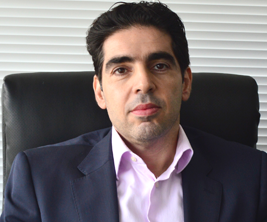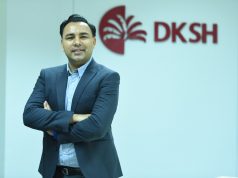Name : AyadChammas
Position : Deputy CEO
MI : When was your first visit to Myanmar?
I first arrived in Yangon in July 2014 for an initial assessment of the IGT project. I was requested to do so by the promoters of the project whom I have enjoyed long and successful business relation with earlier in other parts of the world. The purpose of the visit was to support the start up by performing an initial operational assessment and propose efficiency improvement measures.
MI : What was your first impression of the country then?
I think the first thing that strikes you is the sheer warmth of the Myanmar people. The country and its people are so welcoming, hospitable and pleasant that it immediately puts you on ease. Secondly, you are struck with the potential business opportunities, which to my mind are only limited by your imagination! Every sector that you look at – Infrastructure, Roads, Ports, Power, Avi- ation and Telecom of course; all these offer exciting opportunities.
Further, as the world’s economic center of gravity continues to shift from West to East, the emerging markets are taking center stage as the new growth story. Myanmar is exceptionally well positioned in this con- text – juxtaposed between two of the largest growing economies of the world – China and India. So to that extent, I believe that we are in the right place at the right time!
MI : How was the Irrawaddy Green Tower founded in the first place? How and why did IGT cooperate with Telenor in building and managing towers in Myanmar?
Our group and partners have had signifi- cant experience in building Greenfield Tele- com Infrastructure in several countries. Myanmar is perhaps one of the last unex- plored bastions in the world that opened up its Telecom sector to international opera- tors late last year. One of our Co-Founders has had the distinction of pioneering the concept of shared Telecom Infrastructure and building one of the largest independent tower companies in India with a portfolio of over 40,000 towers with an enviable tenan- cy of 2.2x. Telenor was one of the key an- chor clients of this company in India.
When Telenor won the license here, it was quite natural for them to replicate their successful experience of India in Myanmar. Given the challenging and aggressive roll out, they chose us as their key and largest partners and we are very happy to contrib- ute to their success and to help build the telecom infrastructure in the country.
MI : And how did you end up as the Deputy CEO of IGT?
I have had a very rich experience and long track record of managing challenging proj- ects in various sectors under stringent time lines and strict budgets in various countries and in various sectors such as Energy, Pow- er, Oil and Gas and Infrastructure. Given the fact that the eco-system for such a large roll out does not exist in the country and also, a sustained skill development program is needed, combined almost simultaneously with scaling up our tower construction and delivery processes, requires a leadership which is highly skilled and yet multi fac- eted. I have a strong hands-on leadership style with an eye for details. One of my key mandates is to ensure that we develop a pool of highly talented young locals form Myanmar and reduce the ratio of expats to locals. In this context, I have worked on key projects in more than 12 countries such as UAE, Oman. Kazakhstan, Russia, Georgia, USA, UK, Qatar to name a few, and after having lived with all various cultures, I’m now a firm believer of that one of the most important factors of a successful project is by Thinking Globally but Acting Locally. This initiative of recruiting, training, devel- oping and nurturing local talent has now started paying rich dividends to us.
MI: What are the current projects that your team has been working?
Currently, we are focused on delivering nearly 1,500 Telecom sites for our prime customer – Telenor. This is a mammoth project, which entails a capital investment of nearly US$ 250 Million. This is a reflection of our long-term commitment to developing Myanmar’s Telecom infrastructure and con- tributes to its allover economic growth and prosperity.
As part of this process, we have deployed a world-class delivery organization through- out Myanmar. A regional organization has been established with a solid management team focused on an optimized delivery plan with 275+ full time employees in place, in- cluding 50+ field engineers.
Besides Telenor, as our fundamental busi- ness model is shared telecom infrastructure, we have also started offering our network services to other operators like Ooredoo and MPT KDDI. We are getting a significant trac- tion from all of the operators who are keen to expand their footprint on our network.
I would like to point out that one of the key differentiators between IGT and other Tow- er-Cos is that we provide a complete plug and play service to all our customers i.e. both tower and power.
MI : How different working with dif- ferent stakeholders in Myanmar com- pared to other countries?
I believe it has been a very challenging yet enriching experience. As the country is emerging from several decades of isolation and embarking on ambitious social, political and economic reforms, each aspect of doing business from closed banking (which is also just opening up) to cash economy to lack of power infrastructure, underdeveloped legal framework, poor logistics and supply chain to an evolving regulatory regime…every area has been a huge challenge!
On the flip side though, each of these as- pects also symbolize the opportunities galore, which is attracting significant and much needed foreign direct investments in all these sectors. Concurrently, it also gives one a lot of satisfaction of having achieved the delivery milestones under such difficult circumstances. As they say, when the going gets tough, the tough get going!
MI : What sort of difficulties and hard- ships IGT could be facing while work- ing for the first time in the country?
Besides some of the broader issues that I have already addressed above, some ground level issues such as clarity on build permit- ting process, MIC approvals taking unduly long, different permitting and approval pro- cesses in different states etc. made our task even more complex. Furthermore, land ac- quisition especially for sites located in the Government land has proven to be more challenging. Last but certainly not the least was the challenge of training local contrac- tors, sub contractors and our local vendor partners to adhere to strict health, safety and environmental norms which as an in- ternational company, we are required to implement.
Having said that, I am happy to say that we are now well past our initial stages and the organization and our partners are fully geared to function as a well oiled machinery with world class delivery capabilities.
MI : What are the long term objectives of IGT in Myanmar?
Our vision is: “To become as the Largest and the most Customer Centric Telecom Infra- structure company in Myanmar and is seen as the Employer of Choice.”
In this context, we are clearly a long term player committed to the nation’s growth and developing the related eco-systems. Our shareholders are fully committed to the country and we will continue to examine and evaluate all opportunities in both or- ganic and acquisition led growth. We have already committed significant capital, which makes us as one of the largest foreign inves tors in Myanmar. As an integral part of our Vision statement, we have a strong desire for knowledge transfer and building strong local intellectual capital. I do believe that our efforts in building an ubiquitous tele-
com network will also help the country to achieve one of its desired goals of “an inclu- sive growth” for all communities and hope- fully we should be able to create significant value for all our stakeholders.
MI : What is your opinion on current Myanmar’s telecom sector?
Just one word – unbelievable opportunities… Reality is that technology and connectivity have disrupted industries and transformed lives of billions. With a teledensity of less than 10% Myanmar is on the precipice of a much larger shift as it doesn’t have any historical baggage and is undertaking the reforms in a dig- ital age with an ability to leap frog redundant technologies. I also believe that the pace of adaptation of these new technologies will surpass some of the most optimistic estimates of the experts. I am extremely bullish about the future of the telecom sector in Myanmar which is why we have committed such large in- vestments.
MI : If you could make one major change to any government policy, what would it be?
I genuinely believe that the Government has been very supportive of foreign investments and fairly transparent in its decision-making. The award of the two telecom licenses last year has been a testimony to this. Howev- er, when such a mammoth infrastructure needs to be deployed in a limited time frame, all the enabling laws, processes, policies and guidelines should be thought through well in advance so that the implementation pro- cess is seamless and it must get facilitated at all levels – central and state alike.
Please do bear in mind that any delays caused due to lack of clarity in prevailing laws and policies add to the costs of such mega projects and eventually, such costs do get passed on to the end customer which is clearly not in the national interest. Many emerging countries and markets have adopted best practices in attracting foreign direct investments by having single window and fast track clearances along with attractive tax and duty benefits especially in the core infrastructure sectors and some of these can be easily replicated here.
MI : How is your life here in Myanmar? What are your likes and dislikes?
As I have mentioned earlier, I love living in Yangon. I have travelled extensively to many other towns like Mandalay, Kachin state, Nay Pyi Taw and have interact- ed with people from diverse backgrounds. I also like the fact that there is thriving expat community which has forged strong ties among themselves and the grow- ing hotel and tourism infrastructure is sign of good things to come. Yangon is a comfortable place to live with international standard hotels, restaurants, bars etc. The only downside is that the traffic is becoming more difficult with every passing day and this is something the planners in the Government must look at on priority.










